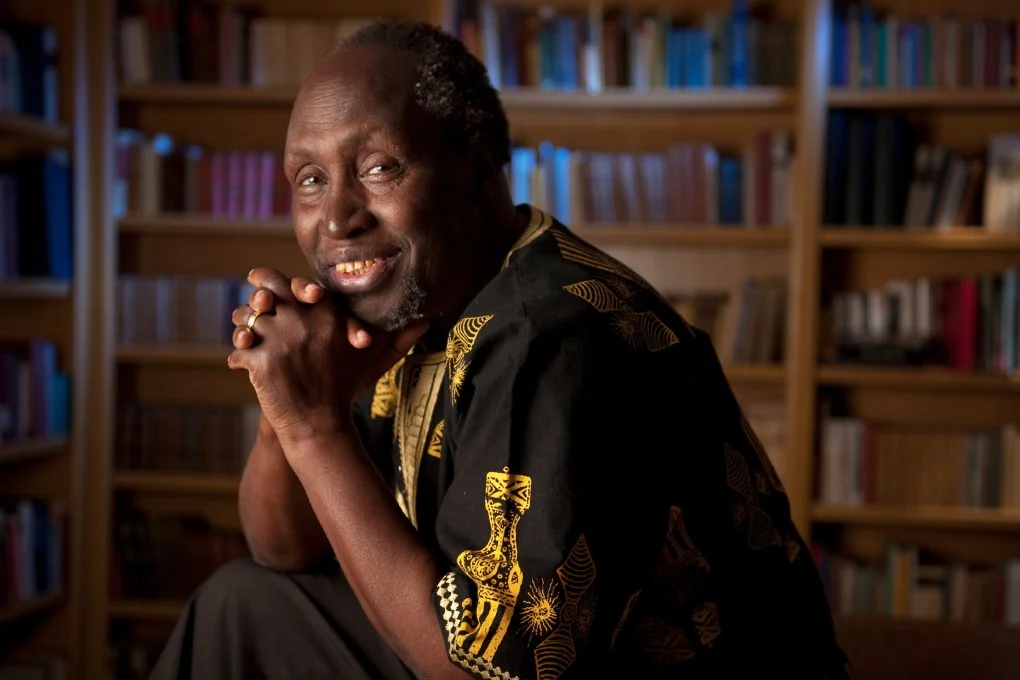Ngũgĩ wa Thiong’o dies at 87: Literary icon who rewrote Africa’s story in Kikuyu

Ngũgĩ wa Thiong’o, the renowned Kenyan author who transformed African literature by turning away from English to write in his native Kikuyu, has died at the age of 87.
He passed away on Wednesday, May 28, 2025, at his home in Buford, Georgia, in the United States.
“It is with a heavy heart that we announce the passing of our father; in accordance with his wish, let us celebrate his life and work.
Rîa ratha na rîa thŭa.
Tŭrî aira!” his daughter, Wanjiku wa Ngũgĩ, posted on Facebook, quoting a Kikuyu phrase that mixes sorrow with celebration.
President William Ruto of Kenya paid tribute to the literary icon in a message shared on X, describing him as “this giant of Kenyan literature who definitively laid down his pen” and praising his fearless commitment, which “indelibly marked our way of thinking about independence and social justice.”
Born in 1938 in Kamiriithu, Limuru, Ngũgĩ—then known as James Ngugi—grew up in the turbulent era of the Mau Mau rebellion against British colonial rule.
The experience profoundly influenced his debut novel Weep Not, Child (1964), making him a critical voice in the post-independence era of Kenyan society.
His 1977 play Ngaahika Ndeenda (I’ll Marry When I Want)—developed in collaboration with a local community—led to his imprisonment without trial. The theatre that staged it was demolished by authorities.
In 1982, facing repression under President Daniel arap Moi, Ngũgĩ fled the country and later taught at Yale and the University of California, Irvine, where he became professor emeritus.
From the 1980s onward, Ngũgĩ renounced English entirely, declaring it an “imported” language.
“Language, any language, has a dual character: it is both a means of communication and a carrier of culture,” he wrote in his pivotal 1986 essay Decolonising the Mind.
For him, true liberation required reclaiming language as a cultural birthright.
Returning to Kenya in 2004, he remained wary of authoritarian resurgence.
“The consequences of 22 years of dictatorship are going to be with us for a long time and I don’t like to see us returning to that period,” he told Reuters in 2007.
His celebrated novels—A Grain of Wheat, Petals of Blood, and Devil on the Cross (written on toilet paper during imprisonment)—are scathing critiques of neocolonial power structures and local complicity.
Translated into nearly 40 languages, his work has inspired generations of writers, including his four children, all of whom are authors.
The family has announced forthcoming “life celebrations” to honour his legacy.
Across social media, tributes under #CelebrateNgugi are already circulating, alongside outdoor performances of Ngaahika Ndeenda and public readings of his work—testament to his enduring voice in global literature.
“Writing is refusing the museum; I write for the living,” he said in a 2020 interview.
In an era grappling with identity, inequality, and memory, Ngũgĩ wa Thiong’o leaves behind not only a body of work, but a vision of literature as both mirror and weapon—reflecting pain, and forging paths to healing.
Source: afrik
About The Author
dailymailafric
I am an avid African news observer, and an active member of Daily Mail Africa.
I’m Passionate about staying informed on diverse topics across the continent,
I actively contribute to publishing on political, economic and cultural developments in Africa.



